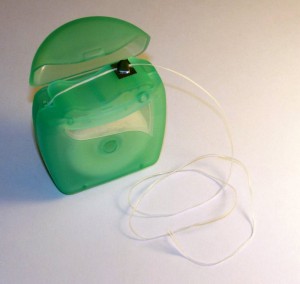 I visited the dentist last week, where she found a small cavity in between my upper back molars. She put in a filling and recommended more flossing. “Make sure you get all of the way up to the gum line when you floss,” she told me.
I visited the dentist last week, where she found a small cavity in between my upper back molars. She put in a filling and recommended more flossing. “Make sure you get all of the way up to the gum line when you floss,” she told me.
Of course, when I got home, I was curious to find out what the evidence says about flossing. The Cochrane Collaboration published a systematic review on flossing in 2012. Their analysis included 12 studies with more than 1,000 participants looking at the effectiveness of flossing on preventing gum disease and tooth decay.
The review found that people who brush and floss regularly have less gum disease compared to those who brush alone. There wasn’t enough evidence to determine whether flossing prevented tooth decay because the studies did not follow participants long enough. And there was very weak evidence that flossing helped to decrease the amount of plaque on teeth.
Overall, the reviewers found that we have poor quality data on flossing and called the evidence “unreliable.”
I am completely surprised that there is such poor-quality evidence on a preventative technique that so many dentists recommend. Personally, I think the evidence shows enough of a benefit that I will continue flossing each evening. But this is certainly an area where researchers should focus in the future.



As mentioned above, I would add another very important factor about the mouth’s flora; I would also capture the type of diet the patients are taking in that data capturing in the dentists database (it could be as easy as using the patient’s database with these extra fields to complete -I am sure many professionals probably have thought of these fields already in their database). This is crucial after 55 y/o when the immune system starts to change.
Peridontal disease is so important and reflecting in general health. If only all dentists had in their database a space to record tooth-cleaning practices from their patients, and tooth health at presentation, at least we would have by now substantial observational data by region to support a quick RCT to confirm cause and effect, and generate evidence based recommendations. (Just an idea)